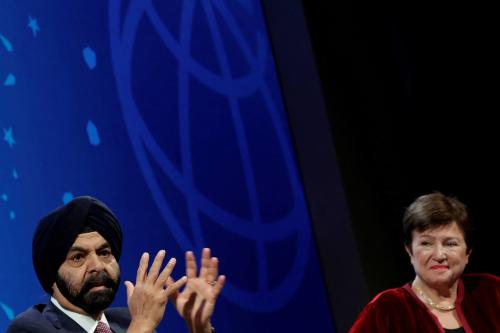Eight experts from three Washington-based think tanks and one non-governmental organization sent a letter to the Executive Directors of the International Monetary Fund (IMF) on March 27, 2008 raising concerns about the proposed reform of IMF quota shares and voting rights and urging Executive Directors not to support the proposal. A large majority of the Directors voted on March 28, 2008 in support of the proposal and forwarded it to the governors of the IMF for approval.
The reform of IMF governance is a key requirement for strengthening this international financial institution at a time of great financial turmoil. The essential goal of the reforms is to enhance the IMF’s legitimacy and credibility, thereby strengthening its ability to facilitate prosperity and stability in the world economy and financial system. One factor weakening the legitimacy of the IMF has been that members’ quota and voting shares, which underpin IMF decisions, have become unbalanced over time, less adequately representing the current distribution of economic and financial power and needs in today’s world. The IMF’s member countries embarked two years ago on a major effort to rebalance quota and voting shares. The goal of those negotiations was to develop a new formula for calculating quotas and votes that would better reflect members’ relative positions in the world. A rebalancing based on the formula would among other things give a substantially greater vote and voice to rapidly growing emerging-market economies. Another goal of the negotiations was to protect the share of lower-income developing countries from declining.
The concern expressed in the experts’ letter is that the proposed package of reforms falls far short of the goals of the exercise. Problems and weakness are numerous (for background, see the summary analysis by Ralph Bryant). A major weakness is the proposed revised formula for calculating the presumptive quota and voting shares of members. Taken on its own, the formula generates changes in shares that move away from rather than toward a closer alignment of voting power with economic realities. The proposed package as a whole achieves its very modest improvements only because the formula is overridden with one-time, ad hoc adjustments that mask the unpalatable consequences of the formula and because the basic votes allocated to each member are tripled. The new formula, despite assurances to the contrary, is not a viable basis for making future adjustments in quotas and votes that will adequately reflect changes in relative positions in the world economy.
The proposed tripling of so-called basic votes (identical in number for each member country), which produces an increase from about 2 percent to 5-1/2 percent in the fraction of basic votes in total votes, is a beneficial move in the right direction since on balance it strengthens the representation of small countries, the majority of which are poor developing countries and many of them in Africa. Yet even that increase falls well short of restoring the share of basic votes in the first decade of the IMF, when they were as high as 13-15 percent of total votes.
The proposed changes in members’ quota and voting shares are very modest, moving only slightly toward achievement of the goals announced for the reform. By way of example, the combined voting share of China, India, Korea, Brazil, and Mexico will increase from 8.2 percent to only 10.7 percent of total votes. The combined share of the five European countries Italy, Netherlands, Belgium, Sweden and Switzerland will decline only modestly, from 10.4 percent to 9.5 percent. Yet the world shares of GDP at market prices of these two groups, which are respectively 11.9% for the five emerging-market countries and 8.1 percent for the five European countries. The disparity between GDPs measured at purchasing-power-parity prices is even greater: the emerging-market countries account for 20.7 of the world total while the European group has only 5.8 percent. And of course the disparities between the emerging-market group for variables such as international reserves and population are still more extreme. China, India, Korea, Brazil, and Mexico combined have 43.1 percent of the world’s population compared with only 1.6 percent for Italy, Netherlands, Belgium, Sweden and Switzerland. The increase in voting share for all “non-advanced” developing countries taken together is only some 2.2 to 2.7 percentage points (depending on the particular definition of advanced and non-advanced countries).
These changes in shares and votes are much too modest to have major influence on how the IMF operates or the sense of legitimacy which it generates around the world. That conclusion is all the more true because of the omission in the package of any changes in the composition and size of the IMF Executive Board. The representation of Europeans on the Executive Board is excessive — totally out of proportion to their role in the current, let alone future, world economies.
Indeed, the largest obstacle to more fundamental governance reform is the unwillingness of European members of the IMF to accept a significant reduction in their voting shares and in their dominance on the Executive Board. By locking in the current proposal, another 3-5 years at least will be lost before a more significant change will be contemplated. It’s a signal that the Europeans, in particular, have not yet come to realize that the world is changing dramatically around them; that if they want to have effective global institutions they will need to give up some of their traditional prerogatives of exceptional representation in these institutions; and that if they want to have a stronger influence in these institutions they need to speak with one rather than many different voices.
The fact that most other member countries (including the United States) appear willing to live with the European blockage may be read as a signal that they have waning confidence in the IMF as a vital global institution. The spread of such an inference would be bad news for the world economy and financial system.


Commentary
Op-edExperts Critique Proposal for International Monetary Fund Quota Reform
April 9, 2008